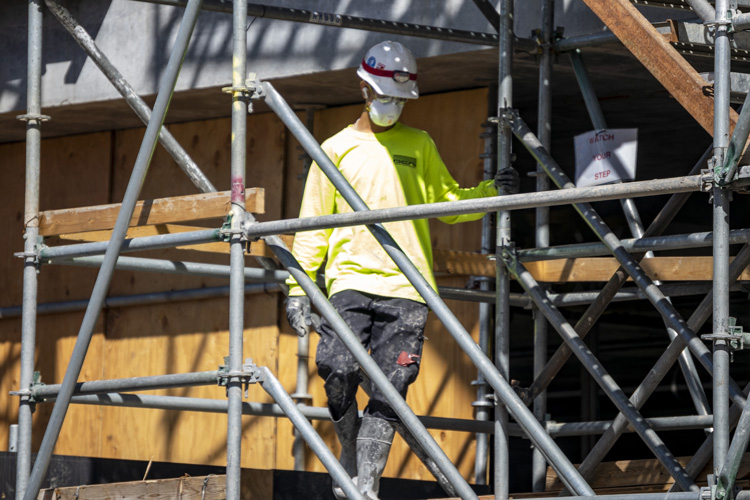Like every industry, the construction industry is dealing with the ongoing uncertainty created by this global pandemic. The situation is evolving and the facts on the ground change constantly.
Governor Ducey’s Executive Order 2020-12, issued on March 23, 2020, designated construction, building management, and landscape management as essential infrastructure operations, and building and construction trades as critical trades under the category of essential businesses and operations.
In addition, Executive Order 2020-17, issued on March 26, 2020, directs that for professional licenses that would otherwise expire between March 1, 2020 and September 1, 2020, renewal is deferred for six months from the date of expiration. This applies to registered Architects and Engineers regulated by the Board of Technical Registration; and licensed contractors regulated by the Registrar of Contractors.

On March 30, 2020, Governor Ducey issued Executive Order 2020-18, which essentially constitutes a stay at home order for Arizona. The Governor’s earlier Executive Order broadly defined essential infrastructure operations and essential businesses and operations and includes the construction industry within that defined category, therefore absent further clarification, it does not appear that the stay at home order will adversely impact construction operations except that businesses that choose to remain open must establish and implement social distancing and sanitary measures established by the U.S. Department of Labor or the Arizona Department of Health Services.
Similarly, the Department of Homeland Security’s Cybersecurity & Infrastructure Security Agency issued advisory guidelines characterizing various aspects of residential and commercial construction as essential infrastructure businesses.
Construction industry groups currently interpret the Federal guidelines as an acknowledgment that those construction activities are included in its list of essential critical infrastructure workers and that construction activity can continue to occur in a way that protects workers and the general public from the spread of coronavirus.
What should construction companies do right now?
• protect staff – have a safety plan to reduce exposure
• decide what ongoing operations are essential and identify the individuals needed for those operations
• establish staff rotations to reduce exposure
• review all contracts
• review insurance policies
• consult with your lawyer, insurance agent, and financial advisor
What should contractors do on their construction sites?
• institute security procedures and requirements
• communicate with clients, with staff and with subcontractors
• document current conditions: video and photograph the site daily; use daily reports to track manpower both your own forces and trade contractors; keep track of who is working from home; monitor job progress carefully – update CPM schedules regularly
What should contractors anticipate on their projects?
• supply chain disruptions
• extended durations due to labor shortages and/or lower productivity
• price escalation for labor and materials
• project delays, suspensions, terminations
How should contractors address these issues?
• document, document, document
• communicate with all stakeholders – Clients, Employees, Subcontractors, and your attorney, insurance agent and financial advisor
• update schedules
• mitigate damages to the extent possible
It is critically important to understand the legal landscape as it may relate to potential claims, delays, suspensions and terminations.
• Understand Force Majeure as well as Delay/Time Extension Provisions in Contracts and the triggering events for Force Majeure and other Delay/Time Extensions
• On Public Works Contracts understand any applicable regulations that may address: excusable delay, time extensions, changes, suspended work, stop work orders, termination, indemnification by the government, relaxing qualifications.
Flexibility is important. Be prepared to negotiate with stakeholders on each project:
• remedies may vary in different contracts
• the attitudes of different Owners may vary
• plan how you will claim for impacts
• discuss potential impacts with Owner in advance
• if work is disrupted, plan how to complete work and discuss with Owner
Evaluate steps contractually required to excuse performance and reserve remedies:
• timely notice
• mitigation of damages
• adhere to the contract’s dispute resolution provisions
• be aware of any ongoing reporting and due diligence obligations
• understand that the failure to follow contractual terms could result in a waiver of Force Majeure remedies and subject you to delay damages and liquidated damages
Congress has passed the Coronavirus Aid Relief and Economic Security (“CARES”) Act. It is important to understand what the CARES Act does and does not do.
• The CARES Act does not make Contractors whole for losses incurred due to the coronavirus or protect employees retirement or health plans.
• The CARES Act does not provide additional federal funding for improving infrastructure. Instead, it provides Federal Agencies with additional funding and repurposes prior funding for operations and administrative expenses. It also assists “partners” with additional resources to support their operations and mitigating impacts of any lost revenue. Those partners are: airlines, airports, and public transit agencies.
What does the CARES Act do for construction companies?
It provides loans and tax breaks.
• Loans – the Paycheck Protection Program allows companies with less than 500 employees to obtain loans to pay employees and overhead costs while continuing operations. The Paycheck Protection Program is run through the Small Business Administration. The Exchange Stabilization Fund Loan Program is for companies with more than 500 employees and is run through the U.S. Department of the Treasury and the Federal Reserve.
• Taxes – tax credits available for employers who implement the new federal paid leave mandate; deferral of employer payroll tax payments through January 1, 2021; allowing companies to carry back net operating losses for up to five years; suspends the limitation on pass-through business losses that will allow Owners of pass-through businesses to fully deduct any losses they incur this year; suspends application of limitations on interest expense deductions which effectively avoids penalizing businesses for borrowing during the crisis; and fixes the retail glitch drafting error from the 2017 Tax Reform law that unintentionally increased the cost of many construction projects such as improvements for restaurants, retail establishments, or commercial office property.
Michael S. Dulberg is a shareholder at Burch & Cracchiolo. He is an AV® Preeminent 5.0 out of 5 peer review rated attorney in Martindale-Hubbell and a highly respected construction lawyer.




